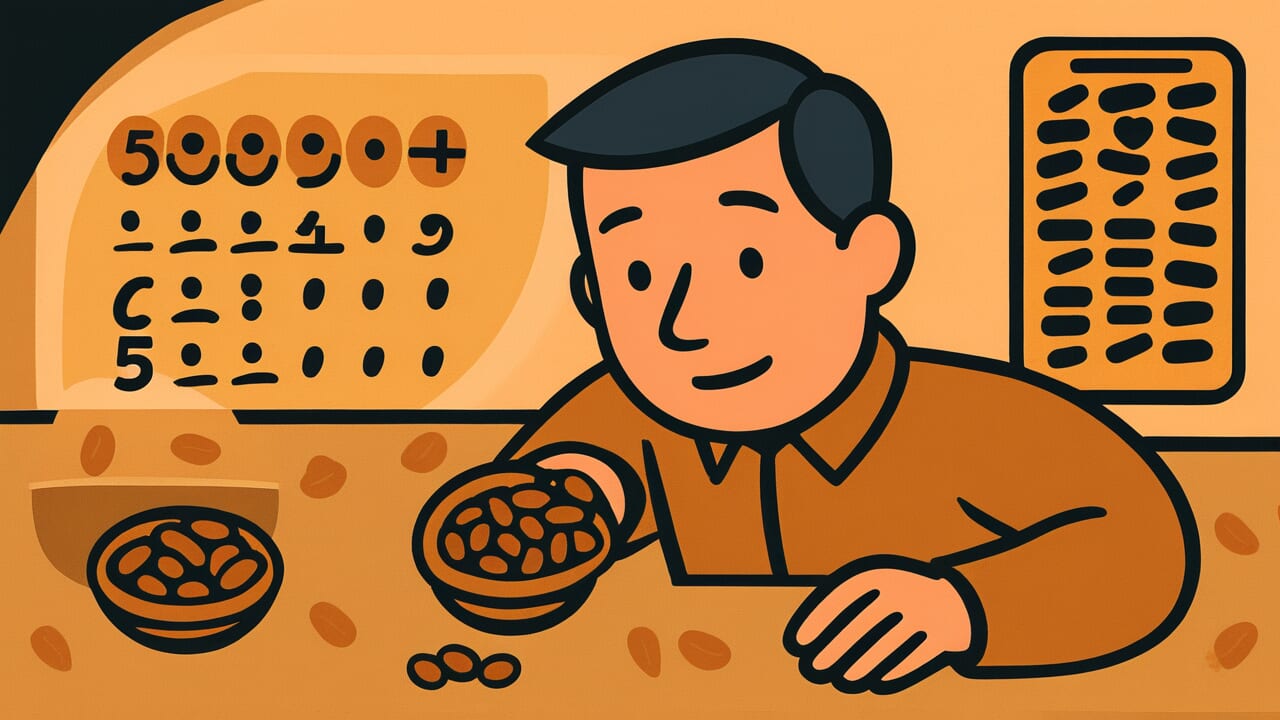How to Read “He knows how many beans make five”
He knows how many beans make five
[HEE nohz how MEN-ee beenz mayk fahyv]
All words are straightforward in modern English.
Meaning of “He knows how many beans make five”
Simply put, this proverb means someone has basic common sense and isn’t easily fooled.
The literal words talk about counting beans to five. This seems like the simplest math problem possible. Anyone with basic intelligence should know this answer. The proverb uses this easy counting as a test of whether someone has their wits about them.
We use this saying when someone shows they understand practical matters. It might describe a person who makes smart money decisions. Or someone who can spot when others try to trick them. The phrase suggests they have enough sense to handle everyday situations without being naive.
What’s interesting is how it measures intelligence through something so basic. It’s not about being brilliant or educated. Instead, it’s about having the practical smarts to function in the real world. The proverb recognizes that common sense is actually quite valuable, even if it seems ordinary.
Origin and Etymology
The exact origin of this proverb is unknown, though it appears in English collections from several centuries ago.
This type of saying emerged when most people lived in agricultural communities. Beans were common crops that people counted, measured, and traded regularly. Simple arithmetic with everyday items was a practical skill everyone needed. Being able to count basic quantities meant you could handle money, trade goods, and avoid being cheated in business deals.
The phrase spread through oral tradition before appearing in written collections. Like many folk sayings, it traveled from person to person in daily conversation. Over time, it became a standard way to comment on someone’s practical intelligence. The saying has remained largely unchanged because the basic idea still makes sense to modern speakers.
Interesting Facts
The word “beans” in English comes from Old English “bean,” which has remained remarkably stable across centuries. Beans were among the most common counting objects in traditional societies because they were uniform in size and readily available. This proverb uses a rhetorical device called understatement, where something obviously simple is presented as if it were a meaningful test.
Usage Examples
- Mother to neighbor: “Don’t worry about my son handling the garage sale money – he knows how many beans make five.”
- Manager to HR director: “We can trust her with the budget calculations – she knows how many beans make five.”
Universal Wisdom
This proverb reveals our deep need to distinguish between genuine competence and mere appearance. Humans have always faced the challenge of quickly assessing whether someone can be trusted with practical matters. In a world where survival often depended on cooperation, identifying reliable partners was crucial.
The wisdom recognizes that intelligence comes in different forms. Academic brilliance doesn’t always translate to practical effectiveness. Someone might know complex theories but struggle with basic life skills. Conversely, a person with limited formal education might possess excellent judgment about everyday matters. This distinction has always mattered because communities need people who can handle real-world responsibilities reliably.
The proverb also reflects our wariness of those who might exploit others’ trust. Throughout history, people have encountered individuals who seem impressive but lack basic competence. These might be smooth talkers who can’t deliver on promises, or authority figures who make poor practical decisions. The ability to spot such people protects both individuals and groups from costly mistakes. This ancient wisdom acknowledges that sometimes the simplest tests reveal the most important truths about character and capability.
When AI Hears This
We use tiny tests to judge huge abilities. Someone knows basic math, so we assume they’re smart everywhere. Someone fails simple questions, so we think they’re hopeless at everything. This creates a strange on-off switch in our minds. We sort people into “gets it” or “doesn’t get it” boxes instantly.
This happens because quick judgments helped our ancestors survive. You needed to know fast if someone could help hunt or build shelter. There wasn’t time for detailed testing of every skill. So we developed mental shortcuts that still control us today. We feel safer putting people in clear categories than admitting intelligence is messy.
The beautiful irony is that this flawed system actually works pretty well. Yes, we miss brilliant people who struggle with basics. And we trust some people who only know simple things. But most of the time, these quick tests do predict real competence. Our brains found an imperfect solution that’s good enough for daily life.
Lessons for Today
Living with this wisdom means developing better judgment about competence in ourselves and others. Rather than being impressed by flashy credentials or smooth talk, we can look for evidence of practical understanding. This doesn’t mean dismissing expertise, but rather valuing the combination of knowledge and common sense.
In relationships and work situations, this perspective helps us identify truly reliable people. Someone who handles small responsibilities well often proves trustworthy with larger ones. A person who makes sound everyday decisions likely has good judgment in more complex matters. This approach protects us from being misled by those who talk impressively but can’t deliver practical results.
The challenge lies in not swinging too far toward anti-intellectualism. The goal isn’t to dismiss learning or expertise, but to recognize that practical wisdom complements formal knowledge. The most effective people often combine both qualities. They can think deeply about complex problems while maintaining their grip on basic realities. This balance becomes especially important in leadership roles, where both vision and practical execution matter. Understanding this proverb helps us appreciate that sometimes the most profound insights come through the simplest observations about human nature.



Comments